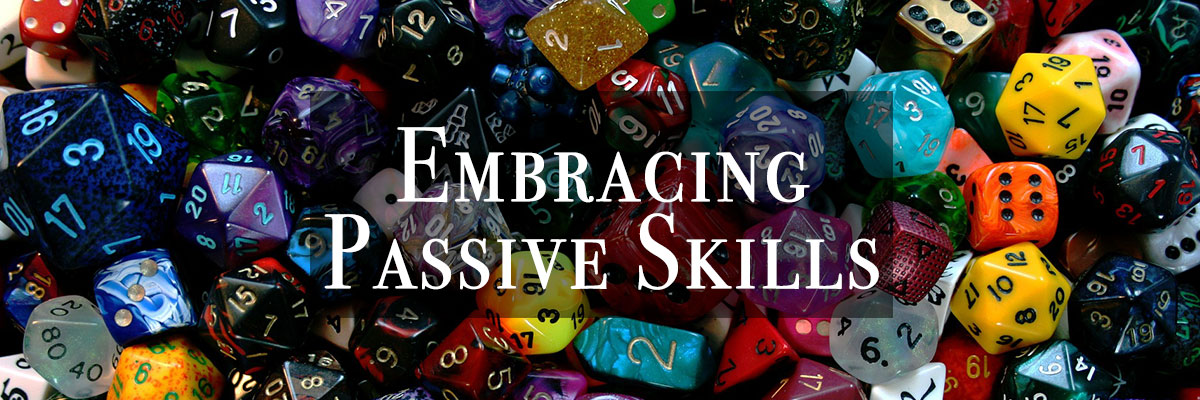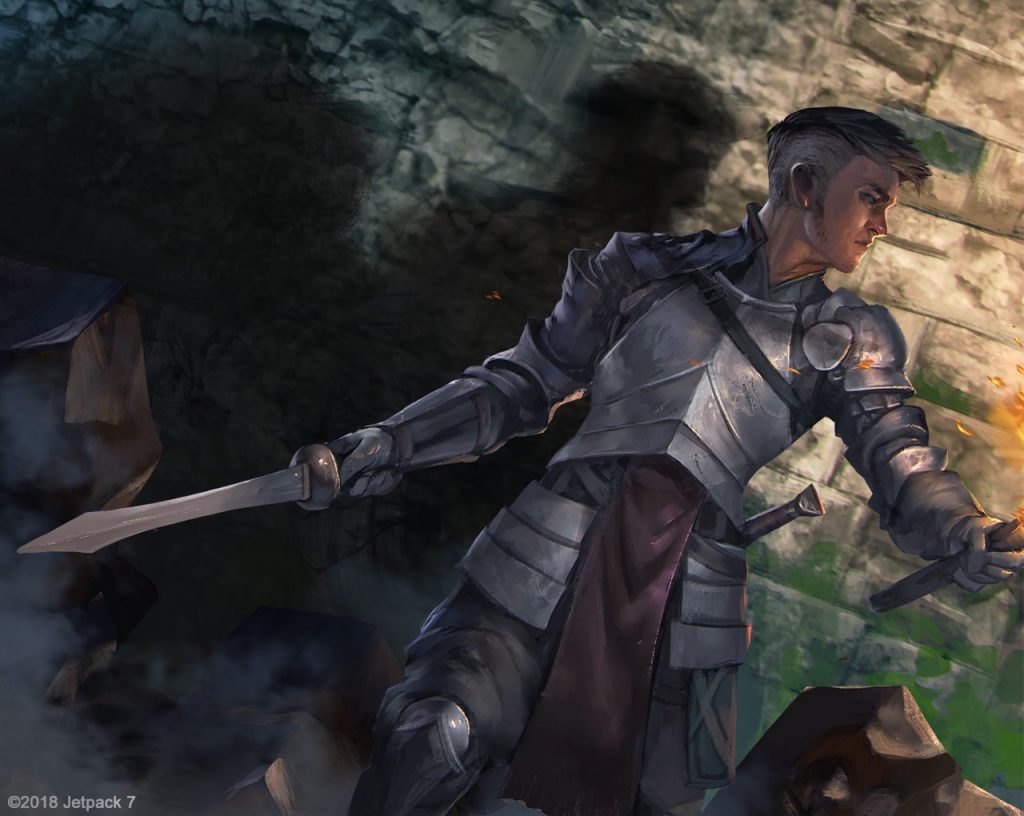Embracing Passive Skills

Passive skills get only a cursory explanation in the core rules, even though passive perception has a place on the official character sheet. They’re vital to detecting hidden creatures, but not explored in great depth. Some Dungeon Masters avoid passive skills, thinking them a cheap way for players to bypass otherwise challenging obstacles. Used without forethought and planning they can feel like nuisances, but learning more about them transforms passive skills into a useful tool.
Working Under Pressure
Most skill and ability checks occur as part of an action. They assume that you are trying to be quick and/or careful because the situation will not allow for indecision. Passive skills represent a constant awareness of the subject matter pertinent to the skill. They function in low-pressure situations because you have the time to deliberate thoughtfully. You can consider more solutions or ponder lore in greater detail. This makes them more reliable, but much slower. How do you know when the use of a passive skill would be possible? If you can answer yes to all three of the following questions.
Do you have enough time? If a creature you are chasing locks the door to the room it has run into, you will not be able to catch it if you cannot get the door open in time. The constraint of time is why skills are never used passively in combat.
Can you try again? Some tasks don’t carry a risk of failure, but there might still be a limit on how many times you can try to complete them. Attempting to pick a complex lock might risk breaking the mechanism. Rolling a 1 could damage the lock in such a way that it becomes stuck.
Are you free to fail? When you fail a Dexterity (Acrobatics) check while falling, you end up taking the full damage of the fall. If there is a serious consequence or penalty that you suffer as a result of failing a skill roll, an active use of a skill does a better job of capturing the risk inherent in your actions. Failure can be subjective, complicating the answer to this question. As with many other rules, the Dungeon Master gets the final call on whether or not a passive skill can be used.
Now that you know how to decide when a skill can be used passively, what are some of the more impactful ways to use them?

Skill proficiencies help to define characters.
Defining Characters
Skill proficiencies originate from the combination of a player character’s race, background, and class. They help define one or more aspects of a character. Using those skills can be a very basic form of roleplaying and failed skill checks can undermine the narrative a player has created for their character. Passive use of skills allows a Dungeon Master to support the stories of their players. They make skills relevant without asking the player to risk embarrassment for their character.
Campaign Paralysis
Overcoming obstacles with the clever use of skills is an extremely satisfying play experience. Getting stuck after a failed skill check usually is not. When the adventure needs a skill check to succeed so that the players can continue moving events along, consider intentionally creating scenarios where skills can be used passively to make progress. Players still need to arrive at that point, which might require overcoming other obstacles or employing creative thinking, but you can be assured that when they do the adventure is not at risk of coming to an abrupt standstill. You also gain the option of making other non-essential parts of the adventure more challenging. Failure in those circumstances can make for an interesting story without putting the campaign at risk.
The Fourth Wall
Players pay close attention to a Dungeon Master when they ask for a skill check. If nothing appears to happen or change, because failure is not always obvious, many players will assume something is amiss. Most will want to try their own skills to see what happens. This metagaming mindset can slow the game down or reward the players with information in an unsatisfying way. Using passive skills instead avoids this situation entirely. If one or more players has a Passive perception score high enough to notice a hidden door, they are rewarded with that information. Should no one be able to notice it, none of the players are even alerted to the potential that they missed something.
Making the Most of Passive Skills
Without dice to roll, passive skills are inherently less fun than skill and ability checks. You should use them in the right circumstances – when you want failure to remain hidden, when success is crucial to advancing the story, or when failure would unravel character narrative.
Required Proficiency. Just as some skill checks require the proper equipment, you can decide that some skills cannot be used passively without training or access to the right tools. This works well in situations where success is needed for a story. The challenge becomes about getting the supplies instead of rolling high enough on the dice.
Taking 20. Under certain circumstances, it might be impossible to fail at a task. With a crowbar in hand, under the protection of a silence spell, and with no other pressing matters to deal with, a determined warrior can pry a door open. If the player is not concerned with rushing the attempt, the Dungeon Master can decide that 10 minutes pass and no skill or ability check is needed to open the door. Prior editions of the game sometimes referred to this as “taking 20,” as though the players kept rolling a skill check enough times to eventually get the highest result on a d20. Giving the players the choice of automatic success or saving time at a moment when every second counts can create a moment of gratifying tension as they grapple with the dilemma.

David Adams
Part-time freelancer, full-time wizard. Works for coin or spell scrolls.
David Adams has been pestering Dungeons and Dragons publishers for the past 12 years and managed to collect a myriad of credits in that time. He has had the good fortune of seeing his content published by the likes of Kobold Press and Wizards of the Coast in addition to other recognizable companies.
David started playing D&D when he was 16 and the game has been an amazing outlet for creativity as well as a fascinating space to explore complex social issues while simultaneously slaying dragons in epic combat. The ability of the game, regardless of edition, to transmute his interests into exciting experiences he can share with friends is the key aspect that keeps his interests fixed upon it.
Embracing Passive Skills

Passive skills get only a cursory explanation in the core rules, even though passive perception has a place on the official character sheet. They’re vital to detecting hidden creatures, but not explored in great depth. Some Dungeon Masters avoid passive skills, thinking them a cheap way for players to bypass otherwise challenging obstacles. Used without forethought and planning they can feel like nuisances, but learning more about them transforms passive skills into a useful tool.
Working Under Pressure
Most skill and ability checks occur as part of an action. They assume that you are trying to be quick and/or careful because the situation will not allow for indecision. Passive skills represent a constant awareness of the subject matter pertinent to the skill. They function in low-pressure situations because you have the time to deliberate thoughtfully. You can consider more solutions or ponder lore in greater detail. This makes them more reliable, but much slower. How do you know when the use of a passive skill would be possible? If you can answer yes to all three of the following questions.
Do you have enough time? If a creature you are chasing locks the door to the room it has run into, you will not be able to catch it if you cannot get the door open in time. The constraint of time is why skills are never used passively in combat.
Can you try again? Some tasks don’t carry a risk of failure, but there might still be a limit on how many times you can try to complete them. Attempting to pick a complex lock might risk breaking the mechanism. Rolling a 1 could damage the lock in such a way that it becomes stuck.
Are you free to fail? When you fail a Dexterity (Acrobatics) check while falling, you end up taking the full damage of the fall. If there is a serious consequence or penalty that you suffer as a result of failing a skill roll, an active use of a skill does a better job of capturing the risk inherent in your actions. Failure can be subjective, complicating the answer to this question. As with many other rules, the Dungeon Master gets the final call on whether or not a passive skill can be used.
Now that you know how to decide when a skill can be used passively, what are some of the more impactful ways to use them?

Skill proficiencies help to define characters.
Defining Characters
Skill proficiencies originate from the combination of a player character’s race, background, and class. They help define one or more aspects of a character. Using those skills can be a very basic form of roleplaying and failed skill checks can undermine the narrative a player has created for their character. Passive use of skills allows a Dungeon Master to support the stories of their players. They make skills relevant without asking the player to risk embarrassment for their character.
Campaign Paralysis
Overcoming obstacles with the clever use of skills is an extremely satisfying play experience. Getting stuck after a failed skill check usually is not. When the adventure needs a skill check to succeed so that the players can continue moving events along, consider intentionally creating scenarios where skills can be used passively to make progress. Players still need to arrive at that point, which might require overcoming other obstacles or employing creative thinking, but you can be assured that when they do the adventure is not at risk of coming to an abrupt standstill. You also gain the option of making other non-essential parts of the adventure more challenging. Failure in those circumstances can make for an interesting story without putting the campaign at risk.
The Fourth Wall
Players pay close attention to a Dungeon Master when they ask for a skill check. If nothing appears to happen or change, because failure is not always obvious, many players will assume something is amiss. Most will want to try their own skills to see what happens. This metagaming mindset can slow the game down or reward the players with information in an unsatisfying way. Using passive skills instead avoids this situation entirely. If one or more players has a Passive perception score high enough to notice a hidden door, they are rewarded with that information. Should no one be able to notice it, none of the players are even alerted to the potential that they missed something.
Making the Most of Passive Skills
Without dice to roll, passive skills are inherently less fun than skill and ability checks. You should use them in the right circumstances – when you want failure to remain hidden, when success is crucial to advancing the story, or when failure would unravel character narrative.
Required Proficiency. Just as some skill checks require the proper equipment, you can decide that some skills cannot be used passively without training or access to the right tools. This works well in situations where success is needed for a story. The challenge becomes about getting the supplies instead of rolling high enough on the dice.
Taking 20. Under certain circumstances, it might be impossible to fail at a task. With a crowbar in hand, under the protection of a silence spell, and with no other pressing matters to deal with, a determined warrior can pry a door open. If the player is not concerned with rushing the attempt, the Dungeon Master can decide that 10 minutes pass and no skill or ability check is needed to open the door. Prior editions of the game sometimes referred to this as “taking 20,” as though the players kept rolling a skill check enough times to eventually get the highest result on a d20. Giving the players the choice of automatic success or saving time at a moment when every second counts can create a moment of gratifying tension as they grapple with the dilemma.

David Adams
Part-time freelancer, full-time wizard. Works for coin or spell scrolls.
David Adams has been pestering Dungeons and Dragons publishers for the past 12 years and managed to collect a myriad of credits in that time. He has had the good fortune of seeing his content published by the likes of Kobold Press and Wizards of the Coast in addition to other recognizable companies.
David started playing D&D when he was 16 and the game has been an amazing outlet for creativity as well as a fascinating space to explore complex social issues while simultaneously slaying dragons in epic combat. The ability of the game, regardless of edition, to transmute his interests into exciting experiences he can share with friends is the key aspect that keeps his interests fixed upon it.

0 Comments